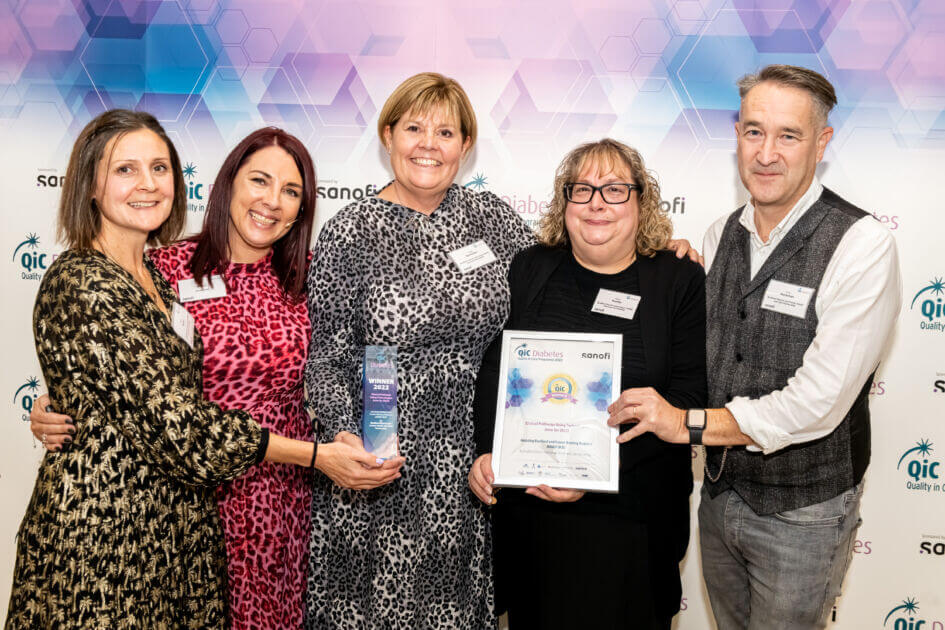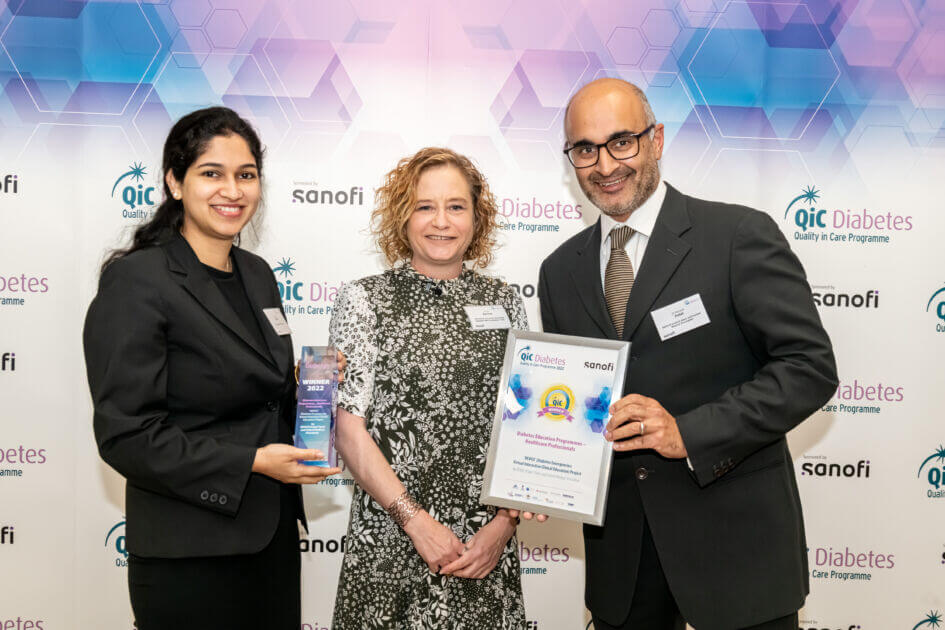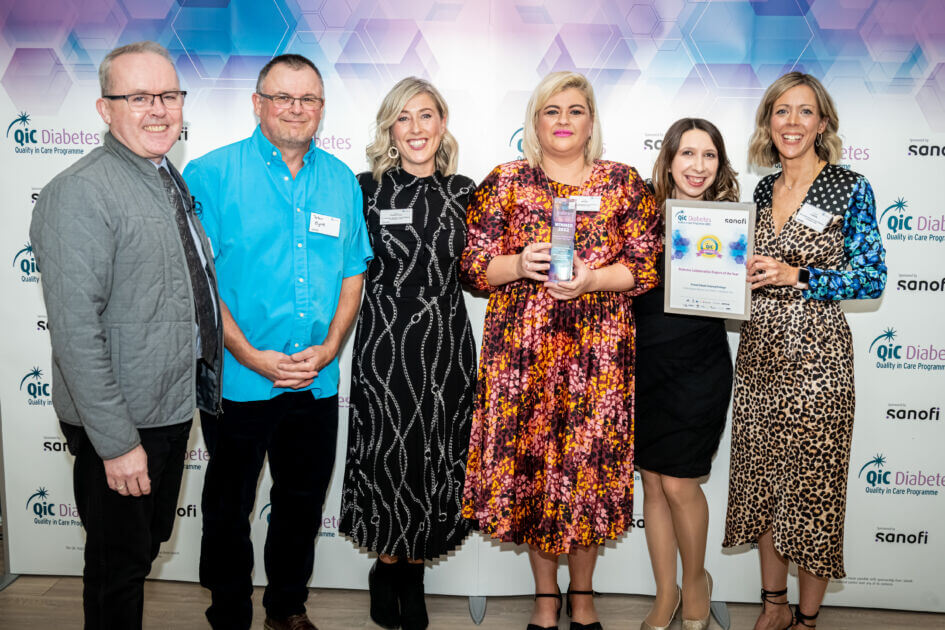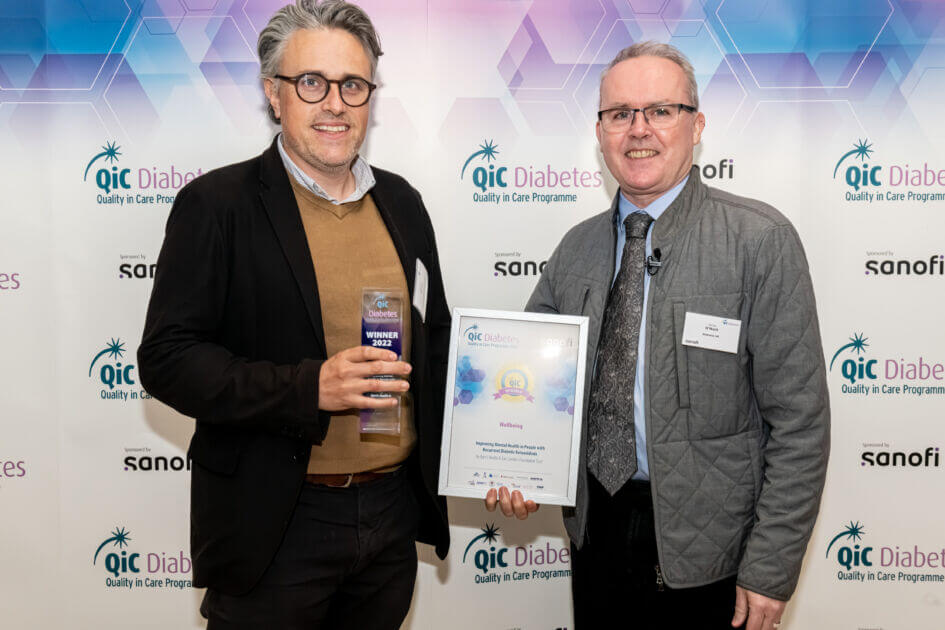Clinical Pathways Using Technologies
New in 2022: This award recognises innovative, well-designed and credible healthcare digital and technology solutions for people with diabetes and their families and carers, which are different to other approaches already available and delivered via any digital or technology channel or channels, online or offline.
Winner: Assisting Bradford and Craven Beating Diabetes (AssistBCD)
Bradford District and Craven Health and Care Partnership
AssistBCD is an interactive, clinical decision-making tool designed locally with multidisciplinary collaboration. Its aim is to support healthcare professionals to provide evidence-based care to individuals at high risk of, or living with, diabetes. The tool is embedded in SystmOne, which is used by all practices and diabetes specialist teams within the Bradford district and Craven area. It is designed to reduce variability, increasing parity and equity in service delivery across the district, and to standardise and support evidence-based decision making. The aim is to help prevent diabetes and improve clinical outcomes and quality of life for those living with diabetes.

Highly commended: Diabetes Clinic@Home
Swansea University Medical School
Swansea University Medical School’s partnership of NHS diabetes specialists, academics, patient groups and Lilly Diabetes UK jointly created the Diabetes Clinic@Home app. This is a simple app to support patient self-management of injection site reactions.
A discussion about injection technique and sites should always form part of a diabetes review for a person on insulin, but during the COVID-19 pandemic most appointments were conducted virtually, and physical examination was not possible. The app was urgently needed because correct technique was difficult to explain remotely.
Patient Care Pathway – Secondary and Community
This category recognises innovative patient care pathway initiatives in response to patient needs and goals, with demonstrable results of improved quality and delivery of effective integrated services that are based in the community and/or in hospital.
Winner: North-East London Type 1 Diabetes Transformation (NATALIE) project
North-East London (NEL) Sustainability and Transformation Project (STP)/Bart’s Health NHS Trust/Homerton University Hospital Clinical Effectiveness Group
The NATALIE project aimed to reduce variation in access, outcomes and experience for people with type 1 diabetes and improve outcomes. The initiative encompassed the North-East London (NEL) Sustainability and Transformation Project (STP), Bart’s Health NHS Trust and Homerton University Hospital’s Clinical Effectiveness Group.
A region-wide, cross-sectional audit of where people with type 1 diabetes accessed care was undertaken, resulting in the NEL Type 1 Diabetes Primary Care Toolkit, a High-Risk register, a type 1 diabetes cluster primary/secondary multidisciplinary team and the use of a novel type 1 diabetes app.
The toolkit improved the accuracy of coding, increased structured education uptake and secondary care access, as well as improving outcomes.
Commended: Pharmacist-led GLP-1 RA initiation clinic in a GP practice
NHS Ayrshire & Arran
NHS Ayrshire & Arran diabetes care was improved by a diabetes specialist pharmacist, who began initiating glucagon-like peptide-1 receptor agonists (GLP-1 RAs) at her weekly diabetes clinic in a GP practice. The aim was to reduce inequalities in access to medicine and poor outcomes as a result of delayed treatment.
This innovative service was offered to patients who fulfilled the criteria of the Scottish Intercollegiate Guidelines Network (SIGN). They were initiated on a GLP-1 RA within 2–3 weeks of first being offered this treatment.
Finalist: Improving cardiovascular outcomes for people with diabetes in North East Essex
North East Essex Diabetes Service
North East Essex Diabetes Service reviewed National Diabetes Audit data to identify areas requiring further attention to benefit the local population. It was found that primary and secondary cardiovascular prevention needed improvement.
A multidisciplinary team “think tank” was set up to review current data, plus plan and implement changes to the local service to positively impact cardiovascular data for people with diabetes. The group created numerous resources, training updates for healthcare professionals/service users and embedded local service alterations. These improved local data for 28 of the 32 (mean change) GP practices in the area.
Type 1 Specialist Service
This category recognises initiatives that deliver specialist support for children, young people and emerging adults, and/or adults with type 1 diabetes. Entries demonstrate a positive impact on the diagnosis and/or management of type 1 diabetes and associated secondary complications.
Highly commended: Redesigning outpatient type 1 diabetes service
NHS Dumfries and Galloway
The COVID-19 recovery phase provided the NHS Dumfries and Galloway diabetes team the opportunity to revise pathways to ensure robust approaches to screening and surveillance of diabetes. The type 1 diabetes clinic was crowded and under pressure, resulting in overdue return appointments, delays completing care processes, less time to discuss and manage cardiovascular risks, and inability to provide timely diabetes-specific interventions. The objectives were to improve completion of the diabetes care processes, introduce responsive, patient-initiated follow-up, reduce the number of overdue return appointments, improve the effectiveness of intervention and promote self-management.
Diabetes Education Programmes – Healthcare Professionals
This award recognises initiatives for the educational needs of healthcare professionals to advance skills and knowledge to support effective and efficient management of people with diabetes.
Winner: DEVICE (Diabetes Emergencies: Virtual Interactive Clinical Education) project
DEVICE project team and Oxford Medical Simulation
The DEVICE project team and Oxford Medical Simulation collaborated to explore the feasibility of using virtual reality (VR) as a means of delivering effective training in diabetes emergencies for non-specialist trainees. DEVICE (Diabetes Emergencies: Virtual Interactive Clinical Education) was developed to improve competence and reduce medical errors. Fully interactive immersive VR scenarios were created to simulate real-life diabetes emergencies. Users then received personalised feedback and performance metrics.
Results revealed increased confidence in managing diabetes emergencies and demonstrated positive changes in behaviour. VR education is a safe, valuable and well liked training tool for diabetes emergencies with great potential.

Highly commended: EDEN/Sanofi Cares Programme
Leicester Diabetes Centre
Sanofi Cares is a national diabetes education programme for health and social care staff. It provides comprehensive, competency-based training, including a knowledge and confidence framework. In collaboration with Sanofi, EDEN (Effective Diabetes Education Now) provided virtual diabetes training based on the EDEN Cares programme through Leicester Diabetes Centre. The aim is to standardise care across the UK for all those in care home and domiciliary settings, ensuring that good-quality care is standard, variation reduced, and the quality of diabetes care improved. The programme was launched on 1 May 2021.
Commended: SANDRA – Supporting prActice Nurses in Diabetes Care Revalidation and Appraisal
NHS Grampian
NHS Grampian noted a concern that the number of experienced Practice Nurses intending to leave the profession within the next five years would leave a shortage of trained professionals to undertake the care of people living with diabetes. To ensure high-quality healthcare was delivered for patients, they knew they must ensure healthcare professionals had the knowledge, practical skills and training required to undertake their roles. However, many did not feel ready to offer diabetes care without further preceptorship, education and time. The SANDRA (Supporting prActice Nurses in Diabetes, Revalidation and Appraisal) programme was developed to meet this need.
Finalist: Finite resources: infinite possibilities to maintain diabetes education and support during the challenges of COVID-19 and beyond
Manchester University NHS Foundation Trust
A suite of diabetes educational resources was developed by the CoDES (COmmunity Diabetes Education and Support) Team at Manchester University NHS Foundation Trust to ensure ongoing educational development and support to all healthcare professionals during the pandemic and beyond. CoDES is a small team comprising two DSNs with finite resources and a significant remit to provide for healthcare professional education.
The new resources were based on local population needs and enabled the team to continue with educational support during the challenges related to the COVID-19 pandemic, at a time when education and support were never more paramount.
Diabetes Education Programmes – People with Diabetes
This award recognises initiatives to educate and empower people living with diabetes and their families/carers to self-manage and stay as healthy as possible.
Joint winner: Teaching “dynamic glucose management” using digital “flipped learning”
Birmingham Women’s and Children’s Foundation Trust
Pre-COVID-19, Birmingham Women’s and Children’s Foundation Trust taught continuous glucose monitoring face to face, prioritising “dynamic glucose management” strategies. Published results showed efficacy after six months. The pandemic required a re-think and creation of a digital package that used “flipped learning” instead of traditional teaching methods. The package included a personalised interactive PDF with videos embedded and competency assessments via Google Forms.
The published six-month data in Paediatric Diabetes demonstrated that this approach achieved parity in clinical outcomes while requiring half the healthcare professional time, at an 18% cost saving (£5371 to £4401) to educate 50 children and young people.
Joint winner: Deapp – structured diabetes education designed to be fun and simple for patients, families and staff
HEAL.med Community Interest Company – Deapp
HEAL.med Community Interest Company’s “Deapp” is a structured education programme for children and young people with type 1 diabetes, delivering core content using a flipped learning approach. It triangulates patient self-learning, bespoke learning resources and a diabetes educator training programme to support patients’ education. Deapp consists of physical props, boards and games, along with bite-sized, animated videos. Using this approach helps to embed knowledge and empower patients in long-term self-management of their diabetes, while putting fun into their diabetes education.
Equality, Diversity and Health Equalities
This category recognises initiatives for people with diabetes and their families and/or carers that illustrate one or more of the eight urgent actions required to tackle health inequalities. These have been identified by the NHS national advisory group of leaders from within and beyond the NHS:
- Protect the most vulnerable from COVID-19.
- Restore NHS services inclusively.
- Develop digitally enabled care pathways in ways which increase inclusion.
- Accelerate preventative programmes which proactively engage those at risk of poor health outcomes.
- Particularly support those who suffer mental ill health.
- Strengthen leadership and accountability.
- Ensure datasets are complete and timely.
- Collaborate locally in planning and delivering action.
Commended: Sheffield’s South Asian support pilot
Sheffield CCG
Sheffield CCG wanted to make a difference by supporting a vulnerable community in the vibrant, expanding city of Sheffield, once famous for its steel. It was noted that the community of South Asian families in the north of the city had a higher incidence of diabetes and were less likely to engage with routine checks. This community also had a higher than city average of young people with type 2 diabetes, who stood to suffer more with their disease in the long term. A culturally sensitive service was established to improve access and health outcomes.
Diabetes Collaborative Project of the Year
This award recognises the value of outstanding collaborative team achievements and contributions that help better prevent, diagnose or treat diabetes and support self-care management to improve the experience of people with diabetes and/or their families/carers.
Winner: Virtual schools training package
Birmingham Women’s and Children’s NHS Foundation Trust
The COVID-19 pandemic forced school diabetes training to be delivered virtually. Birmingham Women’s and Children’s Foundation Trust developed a virtual school training package with competency assessments. They created 50 multimedia, interactive PDF care plans covering all devices, with bite-size videos embedded summarising the teaching and a Google form competency questionnaire.
The total number of school staff trained and competent increased from 300 to 410, a 37% increase. Total cost was reduced from £10 050 to £1660, an 87% cost reduction. These care plans allowed self-paced learning and re-visits to videos at the time of need, and are now a permanent addition.

Highly commended: Diabetes Health Matters with Dr Joan St John
Diabetes Africa
What if medical experts, healthcare professionals, people living with diabetes and their families could be brought together to address the goal of disseminating diabetes knowledge among Black, African and Caribbean communities to improve their health outcomes? For 10 months, Diabetes Africa and Dr Joan St John, host of the Diabetes Health Matters online event series, set out to do just that: provide an open, safe, virtual place to exchange and learn for communities that were hit hard by the pandemic.
With over 3000 live and on-demand viewers and social media content viewed over 10 000 times, Diabetes Health Matters broke new ground.
Commended: ComPASSION
University Hospitals Dorset
University Hospitals Dorset’s diabetes team collaborated with Dorset eating disorders service to provide a multidisciplinary approach to outpatient and in-patient models to support people with type 1 diabetes and a comorbid eating disorder. This group presents significant challenges with diabetes management, requiring intensive engagement around psychological distress and cognitions.
The initiative demonstrated positive outcomes in terms of psychological and physiological benefits, and guidelines and protocols around safe inpatient and outpatient management were developed. Engaging with people with lived experience enabled the development of a suite of tools for other teams to support people locally.
Finalist: Scottish diabetes care quality dashboards
NHS Education for Scotland Technology Service
NHS Education for Scotland Technology Service’s Diabetes Care Quality dashboards were developed to monitor quality of diabetes care using SCI-Diabetes, Scotland’s national diabetes electronic patient record. The technology was developed in collaboration with the Scottish Diabetes Group and the managed clinical networks in each Scottish health board.
Launched in June 2019, the dashboards are updated weekly and provide a visual summary of the status of diabetes care within each domain of care. They track improvements in quality of care and attainment of nationally agreed standards. The tool has received excellent feedback and has supported regional and local collaborative projects.
Finalist: Diabetes Prevention Norfolk and Waveney
Norfolk and Waveney
Norfolk and Waveney is a large, rural geography, with high diabetes prevalence. Preventing type 2 diabetes is a priority. A system-wide collaboration was established, improving access to the NHS Diabetes Prevention Programme (NDPP), alongside a quality improvement initiative improving coding for non-diabetic hyperglycaemia (NDH) and gestational diabetes. Building on methodology developed during the pandemic, 75 practices collaborated in Protect NoW Diabetes Prevention, a data-informed, digitally enabled programme, connecting multiple agencies, and delivering access to the NDPP.
A total of 90 practices collaborated in the quality improvement initiative. Over 3000 NDPP referrals were made and more than 18000 people with NDH were identified.
Finalist: Digital Evaluation of Ketosis and Other Diabetes-related Emergencies (DEKODE)
University Hospitals Birmingham, Sandwell and West Birmingham Hospitals, Walsall Healthcare NHS Trust, University of Birmingham
Diabetic ketoacidosis (DKA) is an acute metabolic complication requiring inpatient care. University Hospitals Birmingham, Sandwell and West Birmingham Hospitals, Walsall Healthcare NHS Trust, and University of Birmingham introduced the DEKODE (Digital Evaluation of Ketosis and Other Diabetes-related Emergencies) cloud-based management monitoring system, developed by medical students and junior doctors. It aims to bring uniformity in DKA management through identifying best practices and reducing resource duplication and wastage using data comparison and aggregation. To date, six hospitals across the West Midlands have joined DEKODE. It also trains medical students and junior doctors in quality improvement and diabetes care.
Wellbeing
This category recognises initiatives that deliver emotional wellbeing support for people with diabetes of all ages and/or their families and carers.
Winner: Improving mental health in people with recurrent diabetic ketoacidosis
Bart’s Health & East London Foundation Trust
There is an established link between mental health struggles and recurrent diabetic ketoacidosis (DKA) in people with type 1 diabetes. In addition, this group is more likely to have further DKA episodes and struggle long-term with diabetes self-management, and those with four or more DKA episodes are more likely to have died by five-year follow-up.
Since April 2019, Bart’s Health and East London Foundation Trust have run a mental health treatment pathway for recurrent DKA. There is weekly screening for new admissions, and those with 4+ episodes are offered mental health case management.
Since launch, there has been a 20% fall in admissions from people with 4+ DKA episodes and a 50% reduction in bed days.

Judges’ Special Award
The Judges’ Special Award (not enterable directly) is judged from all entries received, irrespective of category, for a project that the judges feel deserves national recognition and a platform to be shared with the wider diabetes community.
Winner: DEVICE (Diabetes Emergencies: Virtual Interactive Clinical Education) project
See Diabetes Education Programmes – Healthcare Professionals for description.
Unsung Hero award
Winner: TDFC London
TDFC London was built to provide an open and inclusive football-themed meetup for people with type diabetes. Launched in 2019, the group won the North London Futsal League in January 2022.
The story is beyond kicking a ball and winning a league. TDFC London provides football banter, mentoring, social and mental health support, guidance on diabetes treatment and, most important of all, peer support. This diverse group celebrates each individual as their own entity. It has helped individuals gain access to diabetes technology and referred individuals to health services they were unaware of prior to joining.
Diabetes Professional of the Year
This award recognises diabetes healthcare professionals based in the UK or Ireland who have succeeded in raising standards of care over and above their day-to-day role.
Winner: Dr Stephen Stanaway
Dr Stanaway cares deeply about the work that he does and understands that good relationships are central to supporting people with diabetes. The ethos of his young adult service is to “keep them coming back” – the young person feeling safe and supported in clinic is the bedrock of the diabetes care his service provides, and this is reflected in consultation style and the relationships in the diabetes team.
Dr Stanaway was the first consultant in the UK to integrate psychological support into his young adult clinic, and he continues to develop the service with education and youth work support.
The People’s Award
This award is presented to someone who is based in the UK or Ireland and is not a healthcare professional. Instead, it goes to an individual such as a carer, volunteer, a person with diabetes, diabetes blogger and/or writer, family member – anyone that you think deserves this recognition.
Winner: Lochlan Murdoch
Lochlan is 13 years old and has lived with type 1 diabetes since the age of four. Lochlan is a keen and talented footballer who finds playing sport a way to escape from the daily hard work of living with type 1 diabetes.
Lochlan broke his leg aged nine, which led him to organise a charity event called Lochlan’s Stadium Marathon, which he completed in April 2019 and raised £10 500 for JDRF and the Kris Boyd Charity. The success led to Lochlan, aged 11, to set up Lochlan’s Legacy, his own charity which aims to raise awareness and understanding of type 1 diabetes, break down barriers and reduce stigma.
Lochlan prides himself on telling the truth about type 1 diabetes: the good and the bad. He wants all young people to have access to sport and ensure all coaches and referees have an understanding of the condition. What a 13 year old!
Outstanding Educator in Diabetes
Supported by the Primary Care Diabetes Society (PCDS), this award is presented to an individual who is based in the UK or Ireland and has delivered excellence in education in a specialist or community setting: whether through developing innovative teaching tools or courses; providing mentorship for other educators; or delivering and promoting externally developed training. He or she will have a clear patient focus and be seen as a champion for education in his or her area.
Winner: Fiona Munday
Fiona is a practice nurse with many years’ expertise and an educator of people with diabetes. She has worked brilliantly as an education associate in EDEN for the last five years. As part of a team she designs, develops and delivers education programmes and materials for healthcare professionals nationally and internationally. This she does far beyond in terms of expectations and outputs.
Fiona educates with excellence and inspires all who participate; she makes it look effortless. She has a wealth of knowledge. Kind-hearted and charismatic, her characteristics as educator shine through.
Other categories
Insulin Safety Week Award
Winner: Bedfordshire Hospitals NHS Foundation Trust Luton and Dunstable
Finalist: Betsi Cadwalader University health Board
Finalist: St George’s University Hospitals NHS Foundation Trust
Finalist: University Hospital of Morecambe Bay NHS foundation Trust
NHS England Outstanding Contribution Award for Services in Diabetes
Winner: Coventry Diabetes Team
NHS Wales Outstanding Contribution Award for Services in Diabetes
Winner: Alison Ellis, Diabetes Specialist Nurse in Cardiff and Vale Health Board






Developments that will impact your practice.
7 May 2025